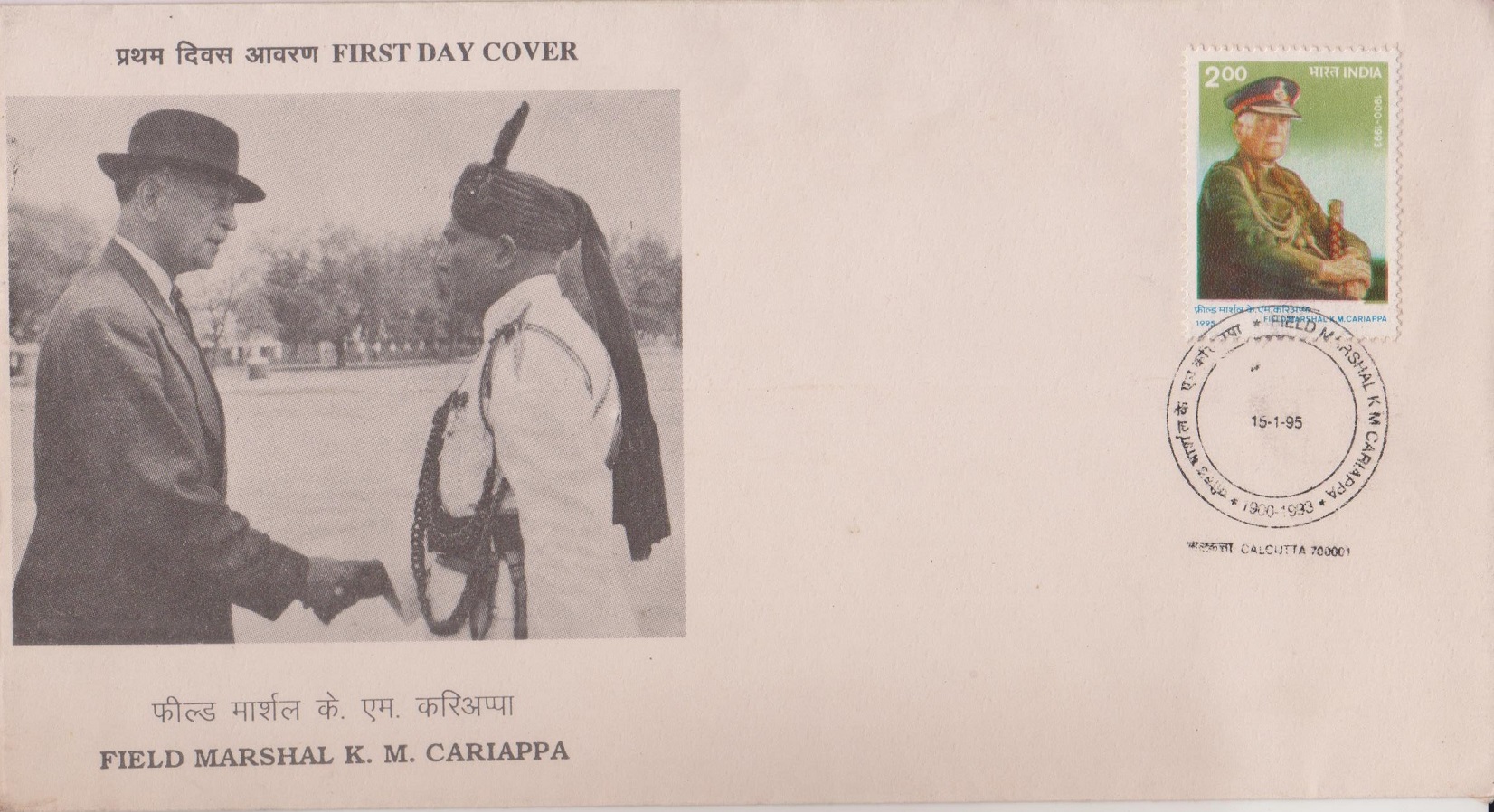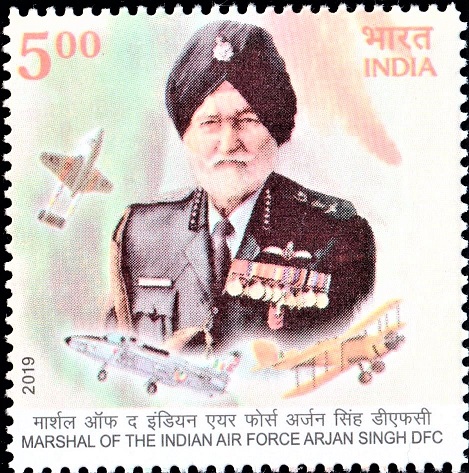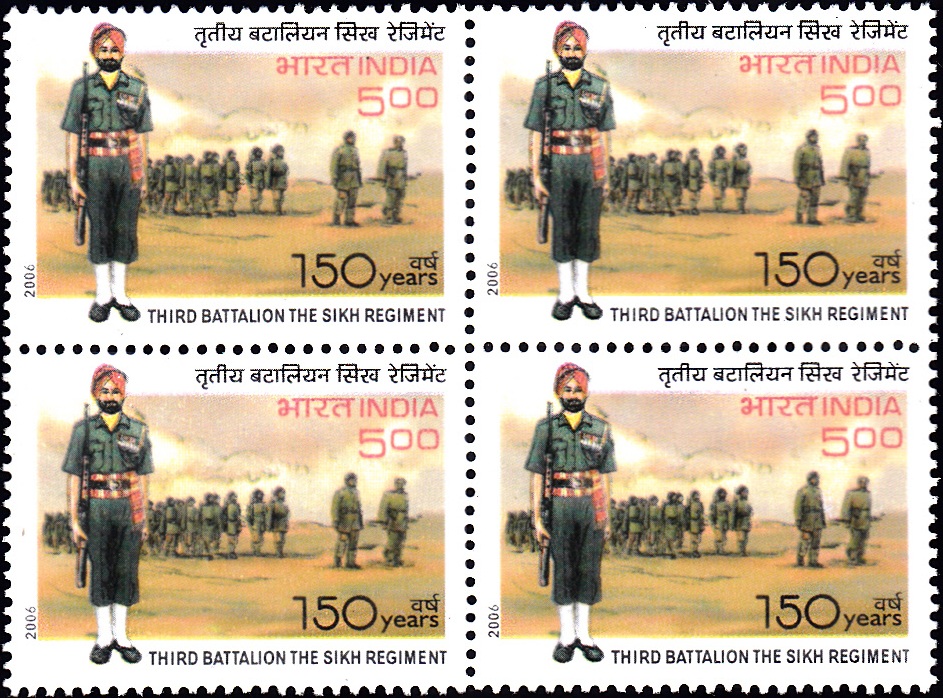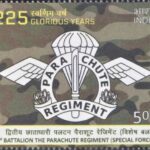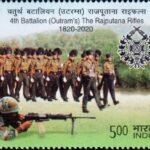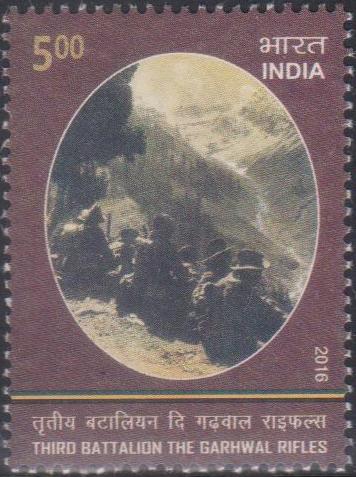
Field Marshal SHFJ Manekshaw
A commemorative postage stamp on Field Marshal Sam Hormusji Framji Jamshedji Manekshaw, MC (Sam Bahadur, Sam the Brave), 7th Chief of Army Staff (India) (1969-73) :

 Issued by India
Issued by India
Issued on Dec 16, 2008
Issued for : Department of Posts is proud to issue a commemorative postage stamp in the honour of Field Marshal SHFJ Manekshaw.
Credits :
Stamp & FDC : Shankha Samanta
Cancellation : Alka Sharma
Type : Block of 4 Stamps, Mint Condition
Colour : Multi color
Denomination : 500 Paise
Stamps Printed : 0.5 Million
Printing Process : Photogravure
Printer : India Security Press, Nasik
Name : Sam Hormusji Framji Jamshedji Manekshaw
Born on Apr 3, 1914 at Amritsar, Punjab, India
Died on Jun 27, 2008 at Wellington, Tamil Nadu, India
About :
- In 1942 at the height of the World War II a fierce battle was raging in Myanmar, then Burma, at the Sittang Bridge. A company of the Indian Army was engaged in hand-to-hand combat with the invading Japanese Forces for the capture of a position, which was critical for the control of the bridge. The young company commander was exhorting his troops when his stomach was fiddled by a machine gun burst. Afraid that his company would be left leaderless if he was evacuated, he continued fighting till he collapsed. His company won the day and the general commanding the Indian Forces arrived at the scene to congratulate the soldiers. On seeing the critically wounded commander, he announced the immediate award of the Military Cross as the young officer was not expected to survive much longer and the Military Cross is not awarded posthumously. Thus began a historic military career of a great Indian soldier who survived to become India‘s first Field Marshal.
- The man eventually destined to be free India‘s first Field Marshal was born into a Parsi family on 3rd April 1914 at Amritsar. After a stint in Hindu College, on 30th September 1932 he joined the first batch of the newly opened Indian Military Academy (IMA) at Dehradun for training Indians for commissioned rank in the British Indian Army. In IMA he was part of the Academy Tennis Team and was awarded the ‘tennis Blue‘. However he frequently landed up in trouble with the laws and rules of the IMA. He received his commission on 4th February 1934 and, after an attachment as was the practice then with a British Infantry Battalion, the 2nd Battalion the Royal Scouts, he joined the 4th Battalion, 12 Frontier Force Regiment, commonly called the 54th Sikh.
- One of the finest officers of the Indian Army, Field Marshal Sam Hormusji Framji Jamshedji Manekshaw, MC, popularly known as Sam Bahadur, has had a long and illustrious military career. His first major military campaign was World War II when he served as a captain with the 4/12 Frontier Force Regiment in Burma in 1942. After that near fatal campaign Sam went to the Staff College in Quetta for a course and served for while as an instructor. He joined the 12 Frontier Force Rifles in Burma and was wounded amidst fierce battle yet again. Towards the end of the War he helped in the rehabilitation of 10,000 Prisoners of War (POWs). He then served as a first grade staff officer in the Military Operations Directorate. Manekshaw successfully handled many planning and administrative problems that crept up after partition. The Jammu and Kashmir operations of 1947-48 were largely successful because of his professional acumen.
- Promotions followed in rapid succession, after command of an Infantry Brigade he was posted as the Commandant of the Infantry School and also became the Colonel of 8 Gorkha Rifles (his regimental home) and 61 Cavalry. He commanded a Division in Jammu & Kashmir and 1959 saw Sam as Commandant of the Defence Services Staff College. On promotion to the coveted rank of Lieutenant General he took over the Command of 4 Corps on 28th November 1962, at a most critical time during Chinese Aggression. The same day Sam addressed a conference, he entered the room with his usual jaunty step, looked as if he were meeting each eye trained on him and said, Gentleman, I have arrived! There will be no more withdrawals in 4 Corps, thank you; and walked out. But the charisma that surrounds the man had preceded him and soldier and officer alike knew the ‘chosen one’ had arrived and henceforth all would be well. It was as if the dark and oppressive atmosphere had suddenly been lightened and Sam was the bearer of the light. The Indian Army suddenly once again became, that proud, disciplined and distinguished force that had fought and triumphed in practically every battlefield of the world. The Chinese aggression was effectively replied thereafter.
- As General Officer Commanding-in-Chief of Eastern Command, he handled the tricky problem of insurgency in Nagaland and the grateful but nation honoured him with a Padma Bhushan in 1968. On 7th June 1969 Sam Manekshaw replaced General Kumaramangalam as the 8th Chief of Army Staff. His immense military experience came to good use during the Indo-Pak War of 1971 which led to a splendid victory under his command.
- During the 1971 War refugees from the then East Pakistan poured into India and Sam had to manage the two tasks, one of defeating the Pakistani Forces and to deliver the goods, his brilliant war strategy led to the unconditional surrender of the Pakistani Forces within a short span of just 14 days. Over 93,000 Pakistani soldiers and civilians were taken POWs. Sam was full of compassion and was the first Indian officer to reach at Delhi Railway Station to meet the Pakistani POWs. He shared a cup of tea and chatted with them for some time. The POWs were seen shaking their heads in disbelief, saying they wished they had generals like him in Pakistan. When the Prime Minister asked him to go to Dhaka and accept the surrender of the Pakistani Forces, he declined, magnanimously saying the honour should go to his Army Commander in the East. The war became an example of perfect coordination between the three units of the Armed Forces and stands out as one of the fastest military victories in the history of. With the Shimla agreement in place, the new nation of Bangladesh was created.
- Sam never raised his voice, but even a mild disapproving look from him with a ‘Sweetheart, this won’t do,’ was enough to shake the stoutest heart. Sharply critical, but always constructively, there was nothing his eye ever missed or his fantastically retentive memory ever forgot. He forgave easily, being basically a kind man. He was human and approachable. His mastery of detail was fantastic and he could quote an answer given verbally or in writing months previously to correct someone who was saying something else.
- As a commander, he was a hard taskmaster. He encouraged his officers in the face of adversity but did not tolerate incompetence. A battalion employed in the Mizo Hills, was paying perhaps a little more attention to the welfare of its troops and, in the process, a little less than desired to the operational side received a rude reminder that ‘someone up there‘ was watching very keenly, every move that was made. A parcel of bangles was delivered to the commanding officer with the compliments of the Army commander with a cryptic note, ‘If you are avoiding contact with the hostile give these to your men to wear.‘ Needless to say, the next few weeks saw a flurry of activity of this battalion resulting in another, more soothing message; ‘send the bangles back.’ That is perhaps Manekshaw‘s greatest contribution, to instill a sense of duty, efficiency and professionalism in the modern Indian Army.
- Sam came from a family with strong values. He had three brothers and two sisters, in 1937 he met his wife Silioo Bode at Lahore and they got married on the 22nd April 1939. Their first daughter Sherry was born on the 11th of January 1940 and Maya was born on September 24th 1945. Manekshaw learnt his strong sense of honour and honesty from his father and his jolly spirit and humour from his mother.
- In 1972 President Shri V.V. Giri awarded him the Padma Vibhushan for his distinguished and selfless service to the nation. On 1st January 1973 he was bestowed with the prestigious rank of Field Marshal, another first in Indian military history. Sam Manekshaw retired a fortnight later after forty years of exceptional and dedicated military service. He died at the age of 94 on the 27th June 2008 at Wellington Military Cantonment due to pneumonia and related complications. He is survived by his daughters and grandchildren.
- Soldiers like him never die; they live for ever in every soldier’s heart and soul.
- Text : Based on material given by the proponent.
Subscribe
Login
0 Comments
Oldest


